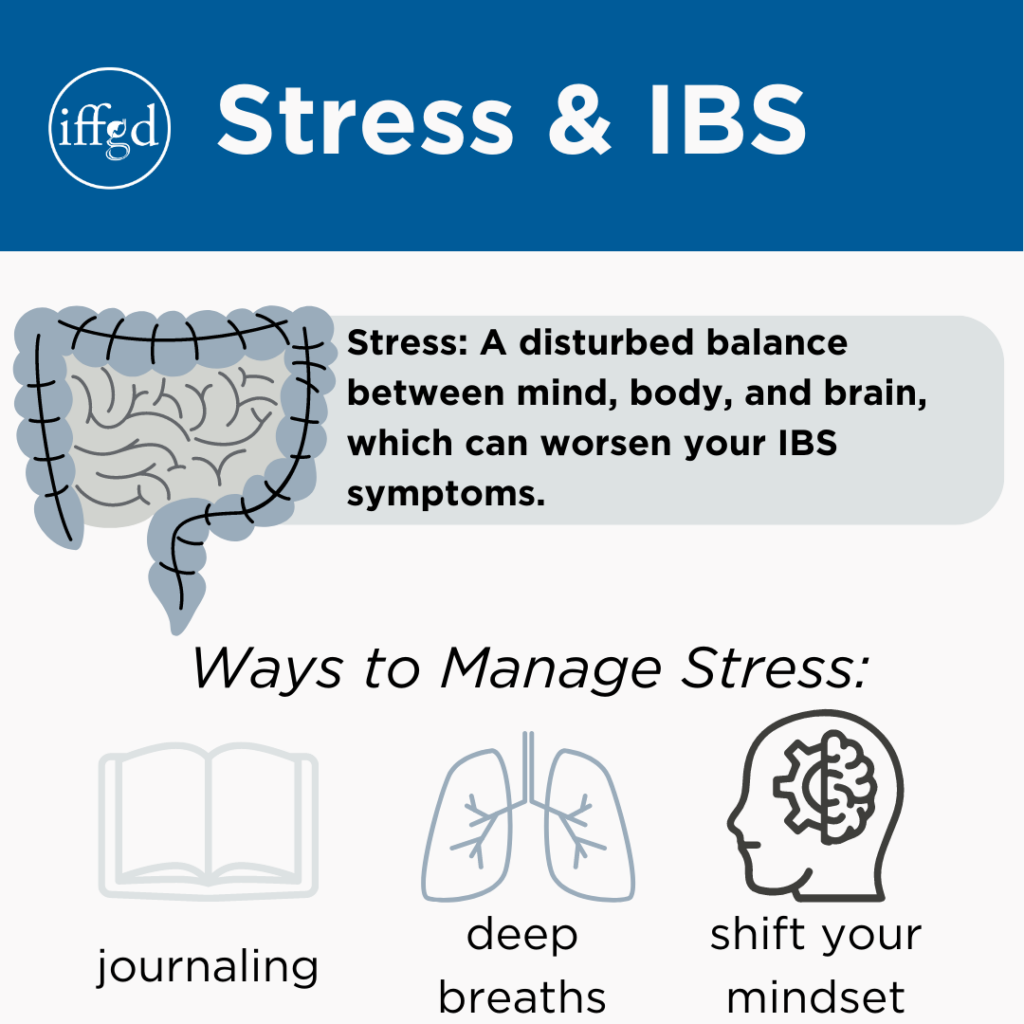Stress is a major issue for many with Irritable Bowel Syndrome (IBS), but what if you could change how you feel about it?
Stress is defined as a perceived or actual disturbance in the balance between mind, brain, and body. It can occur with or without conscious feelings of anxiety, distress, or anger. It can be acute (short term) or chronic (long lasting, more than three months). It can range from daily hassles to life-threatening events.
Your body’s stress-response system is your brain’s “911”. Once a perceived threat has passed, hormone levels are supposed to return you to normal, resuming their regular activities. However, with a chronic illness like IBS, you may be in a constant state of stress. You respond to any threat, whether psychological or physical, by releasing adrenaline and cortisol hormones into your system.

How do these hormones affect your body?
- Cortisol: Helps control blood levels, regulate metabolism, reduce inflammation, control blood pressure, and increases your memory. It is a crucial hormone in protecting your overall health and -well-being.
- Adrenaline: Increases your heart rate and blood pressure, expands the air passages in your lungs, sends blood to your muscles, and changes your body’s metabolism.
Studies regarding stress management, are decades old and have been following hundreds of people throughout their lives. They discovered that stress is not always a bad thing, it can make you smarter, stronger and more successful. Just by changing your mindset regarding stress you will be healthier and happier.
Mindsets are belief frameworks that influence your reality. Changing these could lead to long-term health, happiness, and success.
Tips to Help Manage Stress
- Journaling
Journaling is a simple technique with health benefits of which have been scientifically proven. Journaling can help reduce digestive issues associated with IBS, decrease symptoms of asthma, arthritis, and other health conditions, improve cognitive functioning, and strengthen immune system response.
- Turn negative thoughts into positive ones-
How do you change your mindset to make it a positive experience? Start by thinking about what affected you negatively in the last year. Consider the following question.- What increased your anxiety?
- What made you sad?
- What made you mad?
Now, think about what you gained from the experience you have just observed about yourself. Some find it best to write it out. That’s right, the old fashion way. The tactile practice of putting things down on paper resonates with your brain and makes things more real. If you are a techy person, this also works with a keyboard. Find a place to write. Wherever you are most comfortable. It could be a special place in your home, the nearest coffee shop with your favorite drink, or even the library. Make it a special “ME TIME” event. Whether it is 5 minutes or a couple of hours. Allow it to fit easily into your lifestyle
Breathing techniques
- Close your eyes
- Place your right hand on your heart and your left hand on your belly
- Bring your attention to your breathing (just observe, do not try to change anything)
- Inhale and exhale through the nose
- As you witness the breath, make a mental note on the quality of your breath (is it fast or slow, ragged or even, shallow or deep)
- Now start to even out the breath, making your inhales and exhales the same length
- After a few breaths, start to make your exhales longer than your inhales
- Try counting to 2 on the inhale and counting to 4 on the exhale with a pause in between each
- As you become more comfortable and relaxed try to increase the count, making your exhales twice as long as your inhales. Try to reach a count of 4 and 8, but only as it feels comfortable. If you feel yourself gasping for the inhale, then you have gone too far.
Write down how the experience left you feeling. Don’t worry about what your write, focusing your mind is the most important part. Do not make any rules or make it complicated in any way. - Visit IFFGD’s YouTube channel for videos on breathing techniques including like Breathing Techniques – Dr. Claire Brandon – NES 2021 and Diaphragmatic Breathing – Dr. Meredith Craven – NES 2021
Learn more about psychological treatments for IBS
Adapted from IFFGD Publication #101 “IBS Brochure” By: Lin Chang MD, Professor of Medicine at the David Geffen School of Medicine at UCLA, Los Angeles, CA. Adapted from an article by Douglas A. Drossman MD, Drossman Gastroenterology PLLC, Chapel Hill, NC; Edited by William D. Chey MD, Nostrant Collegiate Professor, University of Michigan, Ann Arbor, MI and taken from IFFGD Publication #277 By: Evan Stone Rubenstein, C-IAYT.









